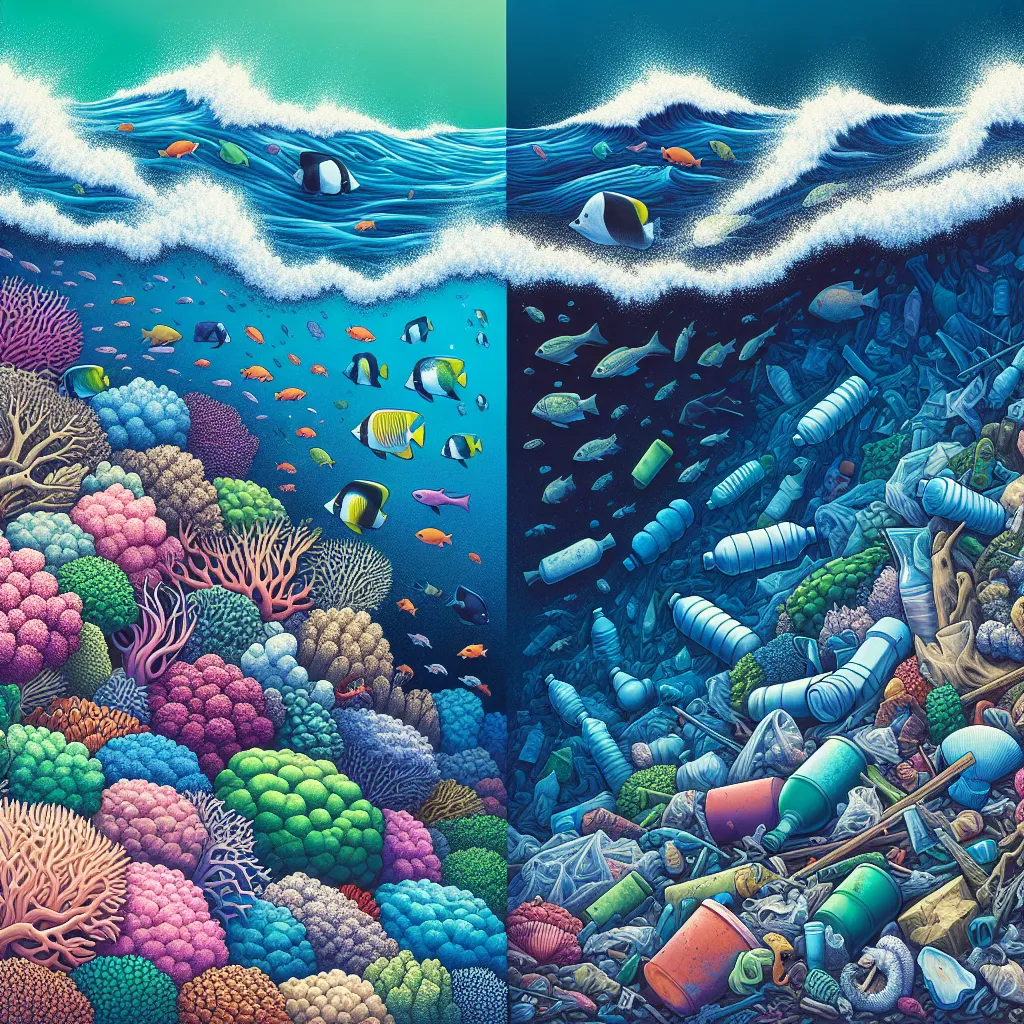Marine pollution is a pressing global issue that frequently appears in IELTS Writing Task 2 questions. Based on recent trends and the increasing importance of environmental topics, it’s highly likely that questions related to protecting marine life from pollution will continue to be prevalent in future IELTS exams. Let’s explore a sample question and how to approach it effectively.

Analyzing the Question
Let’s examine a typical IELTS Writing Task 2 question on this topic:
Marine pollution is a growing problem that threatens the health of our oceans and the species that inhabit them. What are the main causes of marine pollution, and what measures can be taken to address this issue?
This question is asking you to discuss two main points:
- The primary causes of marine pollution
- Potential solutions to combat marine pollution
It’s crucial to address both aspects equally in your essay to ensure a balanced response.
Sample Essay
Here’s a model essay that addresses the question:
Marine pollution has become an increasingly critical issue in recent years, posing a significant threat to the delicate ecosystems of our oceans and the diverse species that call them home. This essay will explore the primary causes of marine pollution and propose several measures to mitigate its impact.
One of the main contributors to marine pollution is the excessive use and improper disposal of plastic products. Single-use plastics, such as bags, bottles, and packaging materials, often end up in our oceans, where they break down into microplastics that can be ingested by marine life, causing severe health issues and even death. Additionally, industrial waste and chemical runoff from agriculture and urban areas introduce harmful toxins into marine environments, disrupting the balance of ecosystems and poisoning aquatic organisms.
To address these issues, a multi-faceted approach is necessary. Firstly, governments should implement stricter regulations on plastic production and usage, encouraging the use of biodegradable alternatives and imposing heavy fines on companies that fail to comply. Secondly, investing in improved waste management systems and promoting recycling initiatives can significantly reduce the amount of plastic waste that reaches our oceans. Education plays a crucial role as well; raising public awareness about the impacts of marine pollution and promoting responsible consumption habits can lead to long-term behavioral changes.
Furthermore, international cooperation is essential in tackling this global problem. Countries should work together to establish and enforce marine protected areas, implement coordinated clean-up efforts, and share best practices for pollution prevention. Encouraging research and innovation in fields such as biodegradable materials and ocean clean-up technologies can also contribute to long-term solutions.
In conclusion, while marine pollution poses a severe threat to our oceans and marine life, there are several effective measures that can be taken to address this issue. By combining regulatory action, improved waste management, public education, and international collaboration, we can work towards cleaner, healthier oceans for future generations.
(Word count: 309)
Writing Tips
When addressing this topic in your IELTS Writing Task 2 essay, keep the following points in mind:
-
Structure: Ensure your essay has a clear introduction, body paragraphs, and conclusion. Each body paragraph should focus on a specific point.
-
Balance: Address both parts of the question equally – causes and solutions.
-
Specific examples: Use concrete examples to support your points, such as mentioning specific types of marine pollution or successful initiatives.
-
Cohesion: Use linking words and phrases to connect your ideas smoothly.
-
Vocabulary: Employ a range of topic-specific vocabulary to demonstrate your language proficiency.
Key Vocabulary
Here are some useful terms related to marine pollution that you can incorporate into your essay:
- Ecosystem (noun) /ˈiːkəʊsɪstəm/ – a biological community of interacting organisms and their physical environment
- Biodegradable (adjective) /ˌbaɪəʊdɪˈɡreɪdəbl/ – capable of being decomposed by bacteria or other living organisms
- Microplastics (noun) /ˌmaɪkrəʊˈplæstɪks/ – extremely small pieces of plastic debris in the environment
- Toxin (noun) /ˈtɒksɪn/ – a poisonous substance produced by living cells or organisms
- Runoff (noun) /ˈrʌnɒf/ – the draining away of water (or substances carried in it) from the surface of an area of land
- Mitigation (noun) /ˌmɪtɪˈɡeɪʃn/ – the action of reducing the severity, seriousness, or painfulness of something
- Conservation (noun) /ˌkɒnsəˈveɪʃn/ – prevention of wasteful use of a resource
- Sustainable (adjective) /səˈsteɪnəbl/ – able to be maintained at a certain rate or level
Conclusion
Protecting marine life from pollution is a critical topic that is likely to appear in future IELTS Writing Task 2 questions. By understanding the key issues, structuring your essay effectively, and using appropriate vocabulary, you can craft a compelling response to such questions. Remember to practice writing on related topics, such as:
- The impact of plastic pollution on marine ecosystems
- The role of international agreements in protecting oceans
- Sustainable fishing practices and their importance
- The effects of climate change on marine biodiversity
By preparing for these topics, you’ll be well-equipped to handle a wide range of environmental questions in your IELTS Writing Task 2 exam. For more insights on related environmental topics, you might find it helpful to read about the benefits of a zero-waste lifestyle and the challenges in managing plastic pollution.